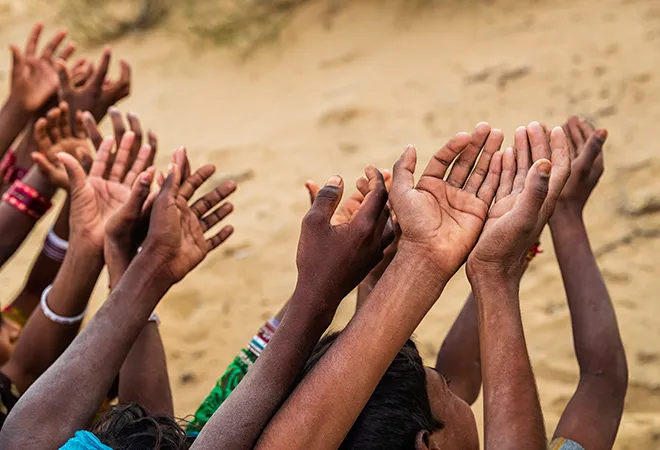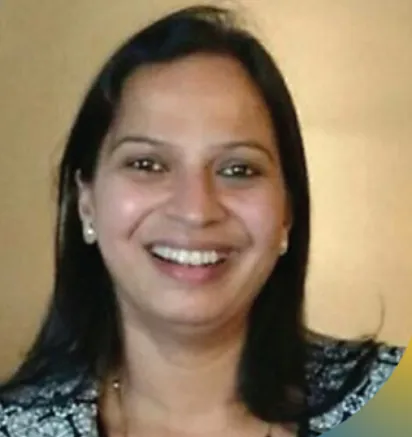India’s malnutrition rates have improved in recent years, but the country is still home to the largest number of stunted children in the world. To combat this, the government launched POSHAN Abhiyaan in 2017, a flagship national nutrition mission that aims to provide a convergence mechanism for the country’s response to malnutrition.
This year, however, the COVID-19 pandemic has likely reversed the progress made towards meeting the Sustainable Development Goal (SDG) of ending hunger, achieving food security and improved nutrition. It is the "worst human and economic crisis of our lifetimes," according to the UN Secretary-General.
COVID pandemic has likely reversed the progress made towards meeting the Sustainable Development Goal (SDG) of ending hunger, achieving food security and improved nutrition. It is the "worst human and economic crisis of our lifetimes," according to the UN Secretary-General.
The 2020 Progress towards the Sustainable Development Goals report saw an increase in hunger, inter-and intra-country inequality and accelerated climate change, leading to irreversible consequences. The World Food Programme predicts a hunger-led pandemic due to COVID-19 by the end of 2020. There is an enhanced need to meet the food requirements of the vulnerable and improve social protection schemes
The recent report of the Global Panel 2020 suggests protecting consumer health from the impact of pandemic by ensuring that nutritional needs are met. Food could be sourced locally and will not only provide safety measures through cash transfers but also support to all.
The Sustainable Development Goals Index 2019-20 shows India’s sluggish performance on SDG 2 (Zero Hunger by 2030). India’s composite score on SDG2 was the lowest amongst all the SDGs, indicating the need for robust policies and initiatives to end hunger in the country. Furthermore, the composite score saw a staggering decline of 13 points, from 48 in 2018 to 35 in 2019. While the eastern region—typically characterised as Empowered Action Group States (EAG)—has shown considerable effort and are grouped under the aspirant category, the road to achieving SDGs seems to be long. A closer look at Eastern India reveals that three out of the four states—Odisha (34), Bihar (26) and Jharkhand (22)—are ranked amongst the bottom six states with respect to SDG 2. Meanwhile, West Bengal, with a score of 40, was barely above the India average and still lacking.
According to the Hunger Report 2020, “since 2015, the global hunger rate has been on the rise and it is clear that climate change is a factor”. The COVID-19 pandemic has caused a greater risk to health due to hunger and malnutrition. Adequate nutrition is foremost to negate the impact of the pandemic and essential for building resilience.
Undernourished people with weak immune systems and those with co-morbidities are strongly linked to adverse COVID-19 outcomes. Vulnerable sections of society, including children, women and migrants, suffer because of inequalities. The 2020 Global Nutrition Report calls for building equitable, resilient and sustainable food systems, and investing in nutrition, especially in the affected communities.
Undernourished people with weak immune systems and those with co-morbidities are strongly linked to adverse COVID-19 outcomes. Vulnerable sections of society, including children, women and migrants, suffer because of inequalities
The recent cyclone Amphan in West Bengal and Odisha and cyclone Nisarga in Maharashtra have further led to the devastation of lives and livelihoods, leaving death and destruction in their wake. This has placed the region, and consequently its most vulnerable population—the children—at a higher risk from issues like malnutrition, food insecurity and disease exposure. There has been a disruption of essential health and nutrition services for children and women, leading to a deterioration in nutrition due to the cyclone and COVID-19. This further adds to the lack of access to sexual and reproductive services for women and adolescent girls, which could have grave consequences with increased maternal morbidity and mortality. With lockdown and restrictions imposed on transportation along with the loss of employment, the hunger crisis has worsened and so have the incomes.
The recent report on the ‘Assessment of Climate Change over the Indian Region’ highlights the threat from climate change—increased floods and cyclones, and its adverse effects on the economy, food security and public health. The change is evident with warmer days and moist weather, which in turn favour the breeding of vector-borne diseases. The World Economic Forum predicts a 60 percent increase in food demand by 2050, however, the ongoing ecological degradation has the potential to cause a hard-hitting food security crisis.
Migrant workers have been stranded at destination states, with no food or other support, forcing them to walk miles to reach their hometown. A rapid assessment on the impact of COVID-19 and lockdown on migrant workers shows the poor state of affairs, with less than 50 percent having no ration and a majority having no identity cards. One of the recommendations is the provision of essential ration across states for the so-called invisible citizens to prevent hunger deaths. An increase in the budget to cover the provision of essentials could be a crucial step in preventing the nutrition deprivation caused due to COVID-19.
A rapid assessment on the impact of COVID-19 and lockdown on migrant workers shows the poor state of affairs, with less than 50 percent having no ration and a majority having no identity cards. One of the recommendations is the provision of essential ration across states for the so-called invisible citizens to prevent hunger deaths
The 2020-21 Union Budget saw an enhanced allocation of INR 35,600 crore for nutrition-related programs and Rs 28,600 crore allocated for women-related programs. The Anganwadi workers were to be equipped with smartphones to update the nutritional status of 10 crore households. Odisha set an example being the first state to prepare a separate state budget document for nutrition interventions. However, the spread of COVID-19 and the lockdowns have thrown the economy and government finances into turmoil. The scale of the challenge in tackling child malnutrition is undeniable and calls for nutrition specific budgets.
In March, the government announced a relief package of INR 1.74 lakh crore under the Pradhan Mantri Garib Kalyan Yojana for the poorest of the poor. This included an extra five kilograms of wheat or rice and one kilogram of pulses every month to help poor and vulnerable families. The scheme has now been extended till November as relief for the festive season. States like West Bengal have extended free ration until June 2021. Several other measures like ‘One Nation, One Ration Card’ scheme to avail food grains under the National Food Security Act could benefit the migrant workers who have no fixed home. Seventeen states or union territories—Andhra Pradesh, Telangana, Gujarat, Maharashtra, Haryana, Rajasthan, Karnataka, Kerala, Madhya Pradesh, Goa, Jharkhand, Tripura, Bihar, UP, Punjab, Himachal Pradesh and Daman and Diu—have started the scheme already.
The COVID-19 pandemic has led to a disruption of nutritional services across the country, with nutritional programmes struggling to cope. This calls for a holistic approach to overcome the vast challenge associated with food security. The need of the hour is the provision of direct cash transfers and free food, and employment to the displaced population, to stabilize the economy. The current situation requires the rapid expansion of benefits and schemes to cover all the beneficiaries, especially the vulnerable section of society.
This commentary originally appeared in News18
The views expressed above belong to the author(s). ORF research and analyses now available on Telegram! Click here to access our curated content — blogs, longforms and interviews.




 PREV
PREV


